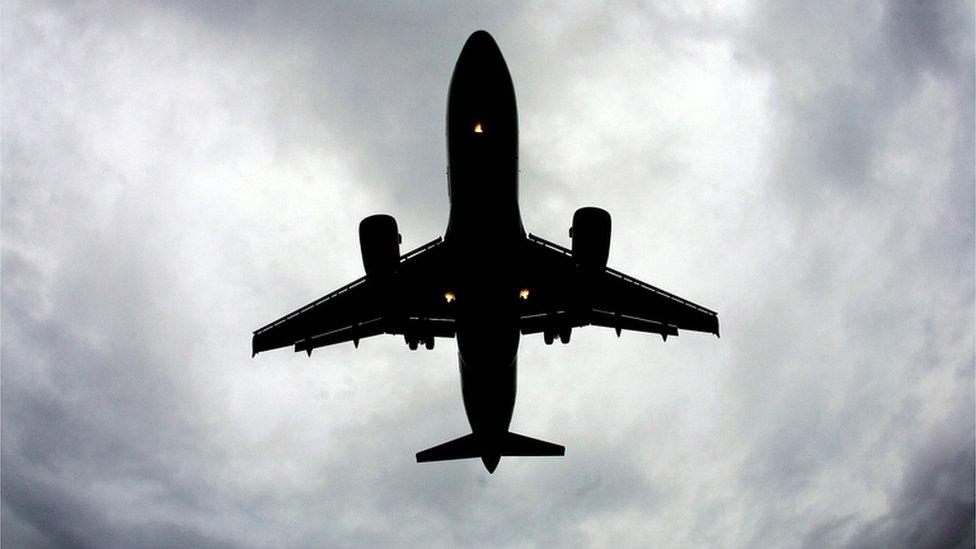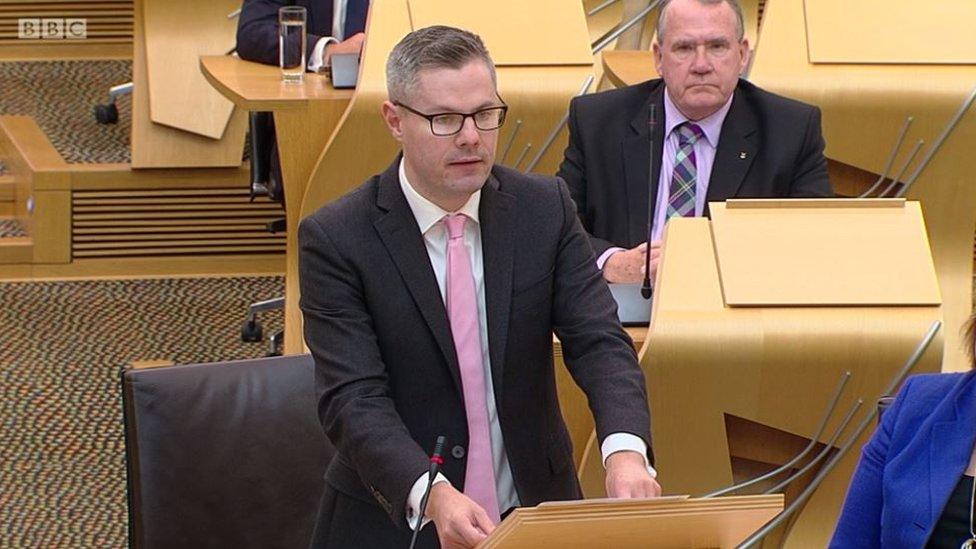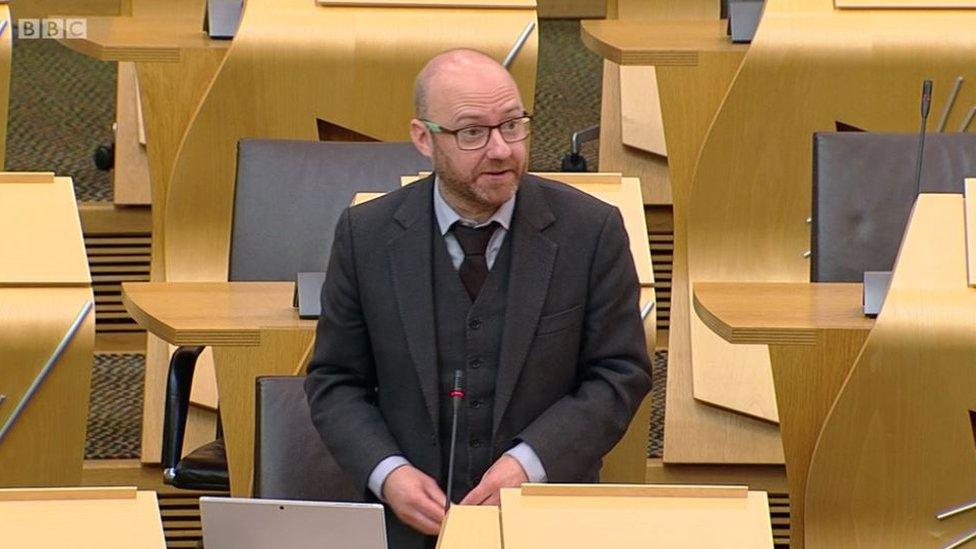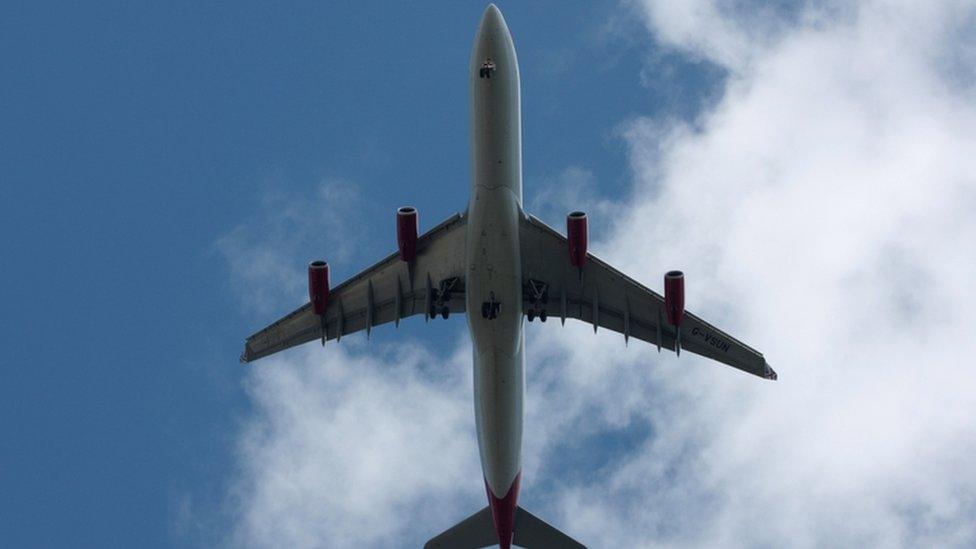Scottish air passenger duty changes hit snag
- Published
- comments

Air passenger duty is charged on all flights from UK airports
Plans to replace air passenger duty with a discounted alternative have been disrupted by legal issues.
The Scottish government wants to replace Air Passenger Duty (APD) with a new devolved Air Departure Tax (ADT) in Scotland from April next year.
However, it said plans to continue exempting journeys from airports in the Highlands and Islands required EU approval under state aid rules.
It is understood that getting this approval could take longer than Brexit.
Finance Secretary Derek Mackay told MSPs that the "mess" was the UK government's fault, saying it could cost the Scottish government £320m to maintain the exemption in the meantime.
However, the Treasury insisted that it was the responsibility of the Scottish government to ensure any new tax was compliant with state aid rules.
And opposition parties voiced suspicion that Mr Mackay was preparing to back down from plans to cut the new tax, something he denied.
The Scottish Parliament was given powers to charge tax on passengers leaving Scottish airports under the Scotland Act, which came into force last year. MSPs signed off the creation of the new tax by 108 votes to 11 in June.
The Scottish government wants to cut the new tax by 50%, before eventually scrapping it completely. It argues the move will boost the economy by increasing the number of flights to and from the country.
However, even before MSPs debate rates, exemptions for the Highlands and Islands are proving an issue for the new tax.

Derek Mackay told MSPs that it was the UK government's responsibility to resolve the issues
Mr Mackay told MSPs that ministers had concluded after careful consideration that the Highlands and Islands exemption would need to be notified for approval from the European Commission. However the onus is on the UK, as the EU member state, to submit this.
He said the "obligation was on the UK government" to make sure the devolved tax would work, saying "they got us into this mess".
The finance secretary said he had suggested that Holyrood's block grant from Westminster be amended to plug the gap, "in a way that ensures neither the Highlands and Islands or Scotland's public finances suffer as a result of this apparent defect in air passenger duty".

Analysis by David Henderson, BBC Scotland business correspondent

The Scottish government seems to have put its new air departure tax into a holding pattern - and these plans may be up in the air for a while.
It's blaming a legal technicality - and foot-dragging by ministers at Westminster.
The new tax has to be approved by the European Commission in Brussels, it says. Tough EU rules which ban state aid make it potentially problematic for flights to and from the Highlands and Islands being exempted from the tax.
Throw in Brexit - and it all gets very awkward.
But the Finance Secretary Derek MacKay may have other pressing reasons - practical and political - for parking this tax plan in a hangar at the far end of the airport.

Mr Mackay added: "I cannot see ADT put into operation with this significant uncertainty hanging over the Highlands and Islands.
"I therefore urge the UK government to step up to the plate, to recognise their responsibilities and to support our proposal which would enable ADT to go forward as planned without causing harm to the Highlands and Islands economies."
The Treasury, which has suggested delaying the transfer of the tax, said it was committed to devolving APD.
'Successful devolution'
A spokeswoman said: "It is the responsibility of the Scottish government to ensure any new tax they design is compliant with state aid rules.
"We are committed to the successful devolution of air passenger duty, and UK government officials will continue to work with their Scottish government counterparts as they seek to develop a solution."
Opposition parties suggested Mr Mackay may have ulterior motives, given that the Scottish Greens have ruled out doing any budget deal with the SNP which includes the APD cut.
Scottish Conservative finance spokesman Murdo Fraser said Mr Mackay was "weaselling out of its commitment" to the tax cut so they could "pally up with the Greens" to get his budget passed.

Opposition MSPs suggested Mr Mackay was paving the way to ditch the tax cut to win a budget deal with Patrick Harvie's Greens
Labour's Neil Bibby also suspected that the legal trouble with the tax was "a convenient opportunity to kick a bad policy into the long grass".
Green co-convener Patrick Harvie said Mr Mackay's "legal quagmire" with the tax was a handy "technical pretext to spare his blushes".
In response to these questions, the finance secretary insisted that the Scottish government "stands by" its position on cutting air tax, repeatedly insisting that "it's for the UK government to resolve any lack of compliance".
He said it was an issue of "successful and competent delivery of devolution", saying the idea of devolution costing the Scottish government money was a clear breach of the "no detriment" clause in the Smith Commission agreement and the fiscal framework.
Lib Dem leader Willie Rennie also thought Mr Mackay was looking for "political cover", but voiced fears that he could be "recklessly risking the future of the discount" with the involvement of the European Commission.
Mr Mackay insisted he had been entirely transparent about the issue, and said that while "of course there is risk" over the EU's response, the UK government wanted the risk to lie with the Scottish government and the people of the Highlands and Islands.
- Published20 June 2017
